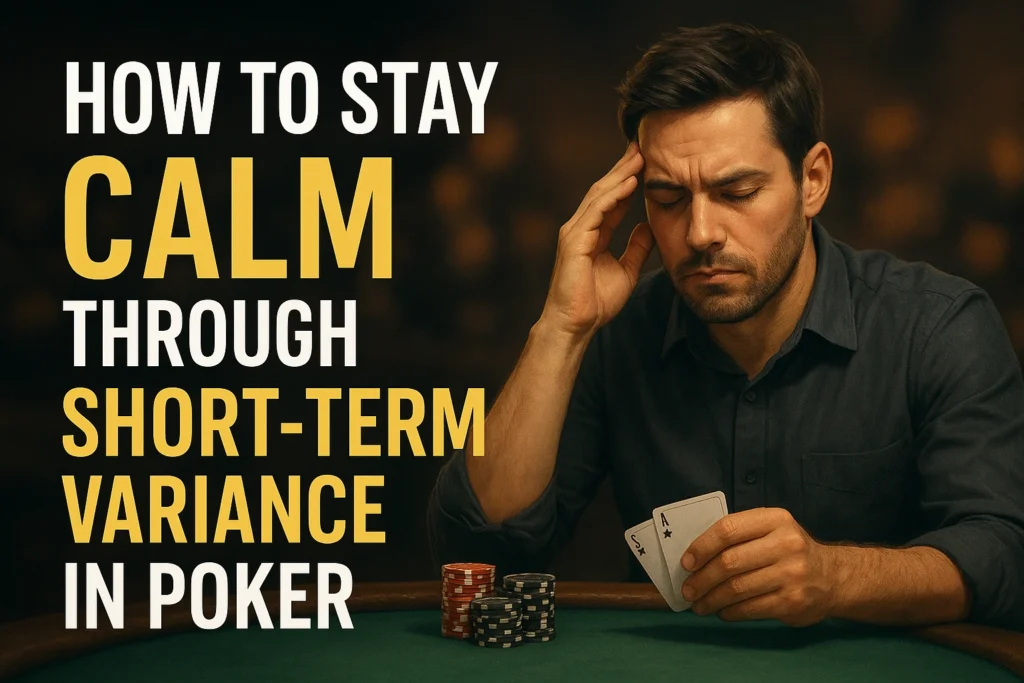
每个扑克玩家,无论技术多么熟练,都会面临结果的波动,这可能会考验他们的耐心和心态。你可以完美地玩几个小时甚至几天,但仍然会因为运气不好而输掉比赛。这就是所谓的short-term variance in poker.
方差不仅仅是一个数学现实;这是一个情感上的挑战。学习如何stay calm through short-term variance将休闲玩家与真正的职业玩家区分开来。最好的玩家知道牌可能并不总是落在他们身上,但他们的反应和决定保持稳定。
在本文中,我们将探讨管理方差、增强心态以及无论牌如何运行都打出最佳扑克的实用策略。
What Is Short-Term Variance in Poker?
Short-term variance in poker指在小样本量的游戏或手牌上发生的自然起伏。即使您做出了数学上合理的决定,您也可能会仅仅因为运气不好而经历连败。
For example, imagine getting your chips in with pocket aces against pocket kings preflop. Statistically, you should win around 82% of the time, but that still means you’ll lose 18% of the time. In the short run, those losses can pile up and feel painful, even if you’re playing optimally.
方差并不意味着你是一个糟糕的玩家,它只是游戏的一部分。关键是你如何respond到它。
Understanding the Emotional Side of Variance
方差不仅与概率有关,还与概率有关。这是心理战。当低谷来临时,沮丧、自我怀疑甚至倾斜等情绪可能会占据上风。
This happens because our brains crave control and immediate feedback. But in poker, even good decisions can have bad outcomes temporarily. Learning to separate results from decision quality是保持情绪平衡的第一步。
When you focus on process over results,方差失去了情感力量。
Strategy #1: Focus on Decision Quality, Not Outcomes
作为一名扑克玩家,你的工作不是赢得每一手牌;这是根据现有信息做出最佳决定。
每次你把钱赚到好钱,你都是在长期获胜,无论那一手牌上发生什么。提醒自己goal is to make +EV (expected value) decisions,而不是赢得每场比赛。
保留一本决策日记,记录你玩得好的手牌,即使它们结局很糟糕。这会将你的心态从“我赢了吗?
专业提示:如果数学密集型策略让人感到害怕,请查看无需复杂数学即可掌握游戏.它分解了想要清晰而不混乱的玩家的决策。
Strategy #2: Embrace the Long Run
扑克奖励耐心。您玩稳定、稳定的扑克的时间越长,短期运气就越平衡。
将扑克视为:a long-term investment,没有一个晚上在餐桌上。专业人士明白,即使拥有强大的技能,短期差异也会造成失败的错觉。
如果您保持一致且情绪稳定,您的true skill edge最终会闪耀出来。
Strategy #3: Reframe Variance as Feedback
不要将方差视为“发生在你身上”的事情,而是将其用作反馈。当你输了的时候,问问自己:
- 只是运气不好,还是我能打得不一样?
- 我是否正确管理了我的资金?
- 情绪影响了我的决定吗?
通过将方差重构为a teacher,不是敌人,你会在这个过程中找到平静。
Strategy #4: Control What You Can, Let Go of the Rest
您无法控制牌或洗牌,但您可以控制:
- 你的心态
- 您的准备
- 您的决策
- 你的反应
这与”Circle of Control” concept from mental models focuses on what’s within your power and ignores the rest.
When you limit your energy to controllable factors mindset, preparation, decision-making, reactions, physical health variance becomes much easier to handle emotionally and physically.
Strategy #5: Use Routine and Review to Stay Grounded
拥有structured pre- and post-session routine在艰难的挥杆中保持您的注意力集中。
Before playing:
- 冥想或深呼吸 5 分钟
- Review your goals (e.g., play focused, avoid tilt, make good folds)
- 检查您的资金管理计划。
After playing:
- 回顾大牌(赢和输)
- 注意情绪触发因素
- 奖励自己坚持你的过程。
定期审查有助于识别模式、错误和情绪泄露。为了更好地进行会后反思,请访问 Right Poker Tables to Maximize Your Learning.
Strategy #6: Manage Your Bankroll Like a Pro
即使是伟大的球员,如果低估方差,也可能会破产。适当的资金管理可确保短期波动不会让您在情感或经济上退出游戏。
General rule:
保持at least 50–100 buy-ins用于现金游戏或200+ buy-ins对于锦标赛,取决于您的风险承受能力。
强大的资金就像一个安全网;它给你mental freedom无所畏惧地玩你最好的游戏。
Strategy #7: Build Mental Toughness Over Time
扑克中的心理韧性并不是忽视情绪,而是忽视情绪。这是关于明智地处理它们。
以下是构建方法:
- Practice mindfulness在会议期间。
- Take breaks当挫败感累积时。
- Accept losses作为旅程的一部分。
- Surround yourself with like-minded players与您有共同的心态和目标。
健康的扑克心态不是一朝一夕就能实现的;这是通过反思、纪律和耐心养成的习惯。
Strategy #8: Connect with Supportive Communities
与其他了解方差的玩家交谈会非常有帮助。
加入在线群组或 Discord 社区,玩家可以在其中讨论策略、分享低迷故事并互相激励。
您可以从探索Club List at BluffingMonkeys.com/club-list, which connects you with active poker communities that help you stay focused and emotionally balanced while improving your game.
Conclusion
Short-term variance in poker是不可避免的,但你对它的情绪反应却不是。最好的球员明白运气可能会波动,但从长远来看,技巧和纪律总是占上风。
By focusing on your decision-making process, managing your bankroll, and maintaining emotional control, you’ll find that variance becomes just another part of the game, not your enemy.
保持耐心,保持冷静,并记住:牌可能会改变,但你的心态才是你真正的超能力。
如需更多见解、策略指南和扑克思维资源,请访问 BluffingMonkeys.com,您值得信赖的伴侣,让您清晰、自信和控制地掌握游戏。
FAQs About Short-Term Variance in Poker
1. What does short-term variance in poker mean?
It means the natural swings in your results over a small number of hands, even when you’re playing well. Sometimes, you’ll lose simply due to luck.
These ups and downs are normal and remind you that poker is a long-term game of skill, not short-term luck.
2. How do I know if I’m running badly or playing badly?
Keep a session log and review hands with other players. If your decisions are sound but outcomes are poor, it’s variance, not poor play.
Consistent hand review builds confidence and helps you separate bad luck from genuine leaks in your strategy.
3. Can I eliminate variance completely?
No. Variance is built into the game. You can only manage it through smart bankroll strategies and emotional control.
Instead of fighting variance, learn to ride it, disciplined players use it as a chance to sharpen their focus and patience.
4. How do pros stay calm during downswings?
Pros focus on the long-term edge and trust their process. They understand variance doesn’t define skill; it tests it.
They use mindset training and structure to stay emotionally balanced and avoid letting frustration affect decision-making.
5. What’s the best way to manage my mindset during a downswing?
Take breaks, meditate, analyze your hands objectively, and remind yourself that your results don’t reflect your worth as a player.
Treat every downswing as a mental workout, building resilience today strengthens your confidence for future wins.
